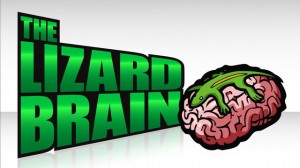 I was reminded of “The Lizard Brain” concept recently; this is definitely worth the read and putting some thought to.
I was reminded of “The Lizard Brain” concept recently; this is definitely worth the read and putting some thought to.
Do you think, or react?
The text below is from the article at www.instantbrainstorm.com/lizard_brain.html
The Lizard Brain
Where does Judgment come from?
When we teach creativity and creative problem solving skills, the first guideline we give is ‘suspend judgment’. It is the root of making brainstorming work for you.
What do we mean by judgment? One type of judgment is using our intellect to assess an idea after we have gathered facts and information. Our neo-cortex, that ‘new’ part of the human brain that lower species don’t have, sifts through the data, draws on our experience, perhaps performs some calculations, and we make an assessment. We reason consciously. Because this process is conscious it’s easier to control and to turn off and on.
Another type of judgment is, well, sneakier. It’s that moment when someone walks into a room, and based on their appearance we receive an internal warning that might say ‘beware’ or ‘I don’t trust her’. All based on appearance. This is judgment also, judgment that happens on a barely conscious level. This is the Lizard Brain at work. The Lizard Brain is concerned with survival. It sits at the base of the skull, at the top of the spine. It’s our old brain. Evolutionists will tell you that we’ve had it since we were – well – Lizards. The Lizard Brain’s reaction to everything, if it has one at all, is limited to the following: eat, attack, run away, or mate. Survival. In today’s modern world our survival isn’t so threatened on a daily basis. (Lizards don’t have welfare, we do.) So what does a survival focused Lizard Brain do?
It adapts.
Urban myth says if you poll a room for people’s greatest fears, the first will be speaking in public and the second will be fear of death. This phenomenon is not lost on the Lizard Brain. Concerned with its own survival, the Lizard Brain has adopted a role as counselor for our social survival. It remembers when we ‘crashed and burned’ in a social situation. It remembers the teacher who singled us out and made us look foolish in front of the class. But the Lizard Brain is not known for its finesse. In the Lizard Brain’s world, things are pretty black and white, and never our fault. This makes it a poor consul for the colorful stratosphere of human relationships.
So our Lizard Brain naturally makes snap judgments. And while our Lizard Brain is busy reacting the following things are happening, 1) our mind is engaged in this fear based judgment and unfocused on the task at hand. We are not contributing. and 2) Somebody else is picking up on our guarded body language and perhaps starting to feel cautious or judged themselves. They are not contributing. The goal is to become conscious of these snap judgments. Recognize the fear based reaction provided by the Lizard Brain; ‘Hmm’; thank our little Lizard Brain for it, someday it might save our life, and then engage the neo-cortex in the task before us.
Imagine this: at a meeting at your office, the New Guy on staff throws out an idea to increase efficiency. The Director of Production’s Lizard Brain interprets this as criticism. (He will have to change, and maybe he’ll fail.) He attacks. He points out that something similar was attempted before, but didn’t work because it confused people and increased costs. Then the boss asks New Guy what he would do to mitigate these issues. (New Guy hasn’t considered this yet, and is caught off guard.) He looks foolish.
The sum of the meeting. New Guy’s Lizard Brain will warn him not to speak up the next time he has a new idea. The Director of Production was rewarded for his attack and that reinforced behavior will rear its head again. The new idea is shot down and the old hand gets points for stomping change. Neither of these contributes to a creative and productive environment.
The ability to suspend judgment, especially the ‘barely conscious’ reactions presented by the Lizard Brain, is an important first step in transforming any environment in a positive way.


